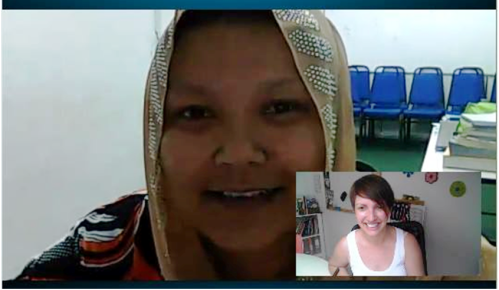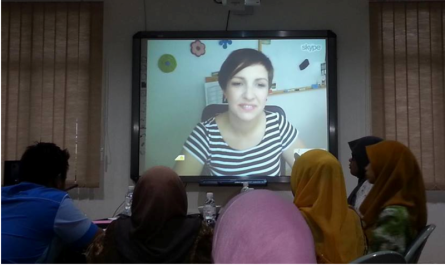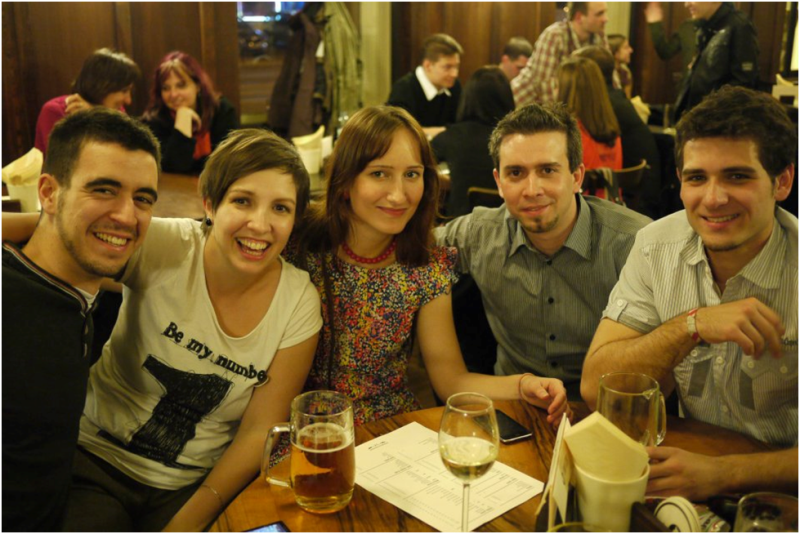
Nina Skyping with Anita Adnan. They’ve only ever met once and will meet the 2nd time to give a talk together at eltforum.sk 2014.
An interview by Martina Bednáriková
Teaching with books often results in our learners’ puzzled looks. On the other hand, the spoken word might be not enough, because it is often lost from one’s mouth to the other’s ear. So, how to teach in effectively? Nina Hanáková will be presenting a few of her ideas on the subject together with Anita Adnan, this Friday, June 6 at ELTForum.sk 2014. In the meantime, don’t forget to play!
Slovak Chamber of English Teachers (SCET): Your concept of teaching without coursebooks is still quite unique in our educational system. What do you as a teacher enjoy about it?
Nina Hanáková (NH): I am sorry to immediately react to one of the words in your question but I find it important to say this: It baffles me that teaching without coursebooks is something people consider unique, revolutionary, unspoken of. This is how we all lea
rn our first languages! So all I am doing is trying to copy that process.
I admit that raising a child (my daughter is 4 now) has helped me to realize all this, it has helped me to go back to the roots, back to my childhood and do things the simple way. But anyone can do that, we don´t need coursebooks to learn a foreign language! All we need is to surround ourselves with as much target language as possible and have someone around who helps us with the process and brings us back up when the motivation goes down.
What I like most about being there for others is to see how their confidence grows. How they are falling in love with English, something they used to be afraid of and didn’t know how to approach. Now they are proactive, taking initiative and even encourage people around them to do the same. It’s infectious and I am determined to spread that infection until something better comes along.
SCET: Tell us more about your online Skype lessons. How did you get to teaching via skype? Why would you recommend any teacher to start teaching via Skype? Can you tell us more about the reactions of your own students to it?

Skyping with teacher trainees in Malaysia
NH: I use Skype to coach individuals and to transfer myself to other countries and classrooms with my international colleagues. I started teaching via Skype when one of my individual students was sick but didn’t want to miss our lessons. This was back in the day, when I was still teaching with coursebooks. So we both turned our cameras on, had the book in front of us and followed the lesson plan as if we were in the same room together. As time went by I slowly started using more online resources with her – we were both online after all! – until I realized all that the book was doing was give us structure. I also realized the student was practising more listening skills than ever as she couldn’t really see my mouth (the webcam is always a little slower) and nothing was distracting her. It also gave her more autonomy as she started looking for stuff online that was most relevant to her and that she enjoyed. Now I mainly teach with the webcam off, it makes the student focus better on what we are doing and what I am saying, a very important skill in the language learning process. Not focusing enough is why we don’t learn a language as fast and as effectively as we could.
I could talk for hours about why coaching via Skype works. Apart from saving a lot of travel time and being able to have a lesson even when you are a bit sick, it brings you and the student much closer together because it feels like you are on the phone with a good friend. Browsing different websites, using online dictionaries, watching and discussing videos/photos, quickly Googling whatever it is you need, make the learning much more fun, much more real. And noting down mistakes has never been easier, with the camera off the student is not nervous you are constantly recording their mistakes. To me Skype is a great tool to make the learning process more natural. And although some students are a bit hesitant at first, they soon discover the great potential of learning via Skype and many even keep working with Skype in their professional life.
SCET: Tell us more about your EnglishBrno Pub Nights. What does such a pub night with you look like and why do you think it is useful for learners?
NH: I started the pub nights soon after I dumped the coursebooks. Since then I’ve managed to organize 11 of them, at first we had 20 participants, now there are usually 60 – 100. The idea is to bring my students together with the growing international community of Brno, drink, chat and have fun – in short: to give everyone an opportunity to make English-speaking friends. There is no special programme, sometimes we have a band or a dj, sometimes we play a silly game, but mostly it’s about hanging out like you would if you lived abroad. The students can practise their speaking skills in natural environment, they broaden their horizons by discussing things with people from different cultures and they are one step closer to feeling more confident about their English speaking skills. Then it’s much easier for them in the working environment to make that international phone call or speak up at a business meeting conducted in English. There´s nothing more rewarding for me than seeing my students conquer their fear of speaking English in the real world.
SCET: Tell us more about your own teachers. In what way did they help you learn when you were a student? How did they influence you as a person or the way you teach?
NH: To be honest I don’t have the best memories of school, it was extremely boring for me, although I had good grades at school. Because that’s what you did in my family. So I crammed unnecessary stuff, struggled with maths and chemistry and loved languages and social sciences. When my high school years were over I thought now I would finally study what I loved the most – languages, at university. A very similar thing happened though, tons of useless things to learn that I immediately forgot, many essays to write, something I wasn’t good at, and oh my, was I one happy girl when all this was over. As Ken Robinson says, universities just breed university professors, they don’t prepare us for life.
I do have fond memories of several teachers though. They were the ones who stood out, they were the misfits in a sense. Those who went the extra mile to make sure we understood what they wanted us to learn. My French teacher from elementary school who organized our very first exchange trip to France in 1992, my Czech teacher at grammar school – the great poet Jan Slíva, and three university professors in Olomouc where I graduated from English and Dutch philology – Libor Práger, David Livingstone and Václav Řeřicha.
SCET: What do you do to develop your own teaching skills? Where do you get new ideas for your own teaching?

Singing with Chris
NH: I am CELTA certified. That course gave me a good basis for working with groups. But other than that I am not a big fan of ELT methodology seminars, they are often too stiff for me. I find my way of teaching to be more about life than just the language itself so the most inspiration I get is from personal growth literature, videos and workshops. The most recent workshop I went to was on the topic of intuitive pedagogy. We were kids again, just playing and having fun and learning from each other by making mistakes. These types of activities are very inspiring for both my personal and my professional life, as they
often blend in one.
My other important source of inspiration is my own students. I get most creative while I am teaching, I just love the process of going into the unknown and letting the students do the discovering. I am there with them but hardly ever as a teacher in the traditional sense. As my dear colleague David Deubelbeiss says, “When one teaches, two learn.” Recently I have been completely infatuated by the research done by Sugata Mitra. I am now playing with his self-organized learning environment ideas and the students love it.
And last but not least, I get inspired by my colleagues, those who I work with and those who I watch from afar online. If I could name just one from each category, it would definitely be my colleague Chris Barickman, the teacher I have been working with the longest, and Scott Thornbury, the founder of Dogme.
SCET: You are very active on social media. Why is it useful for teachers to read and follow ELT blogs or be active on Facebook? How do you as a teacher profit from it?
NH: Yes, I am very active on social media, I blog and follow other ELT blogs and Facebook posts from those I admire. Building your PLN (personal learning network) has never been easier. It gives you a sense of belonging, a safe place to go when you need help, encouragement or inspiration. With social media like Facebook and Twitter the world has become smaller even in our field. It is so interesting for me to see that over in Malaysia they have to deal with similar issues when learning English, that over in the US they have similar standardized tests for getting good grades, that over in Finland they understand how important individualized learning is. It makes my cause not only local and even more worthy fighting for when you know there are many people out there like you. I now get a lot of messages and emails from teachers around the world telling me how my FB posts, blog posts, videos and interviews inspired them to look at teaching from a different perspective. Do I need to say how fantastic that is?
SCET: Apart from teachers relying less on coursebooks, is there anything else that you think could be improved in today’s educational system? Based on the current situation in education as well as your teaching experience, how do you see the future of English teachers?

Self-organized learning environment (Nina was digging the weeds in her garden in the meantime)
NH: Let’s give the students freedom in what they want to learn! Individualize the learning process, we all have different talents, we are united in our differences and that’s what makes the world beautiful. Let´s cherish each individual instead of asking the fish to climb a tree. Let’s teach kids how to think constructively instead of pushing them to memorize facts they can find on Google in a split of a second. Let´s make kids and adults love education again! To me that’s the only way to go if we as society want to keep growing. We are now educating our children for jobs that don´t exist anymore. Isn’t it time to wake up?
Like I said before, I have recently been greatly influenced by the ideas of Sugata Mitra who says that given the right questions and tons of support, we can now learn most things by ourselves, thanks to the internet. We are able to self-organize our studies, with the help of a guide, an instructor who takes our hand to walk us to different doors – by setting the task, building curiosity and then leaving the stage to let us go through the door ourselves or with the help of our peers. When we as teachers let that happen, when we give the autonomy to the student instead of playing the god who knows it all, when we sit back and watch, or go to the garden digging the weeds instead, we can be surprised how simple it actually is. I know I am, every time I let my students work by themselves. Believe me, they are neither lazy, nor unmotivated if you make this shift. They are just like you and me: eager to learn and become better at whatever it is they need.
Nina Hanáková has been teaching English to adults as a freelancer for the past 10 years, both offline in her hometown of Brno, CZ, and online via Skype and social media. She runs her own teaching business called EnglishBrno where she specializes in experiential courses without coursebooks. She encourages students to set personal language goals, interact socially with international speakers and use online resources. Nina is a big fan of video, recording some of her lessons and herself explaining grammar and vocabulary. She blogs, is very active on Facebook and organizes EnglishBrno Pub Nights. She is a graduate of English and Dutch linguistics at Palacký University in Olomouc, CZ and is CELTA certified.


Pingback: Nina Hanáková: Be Playful | Just Me